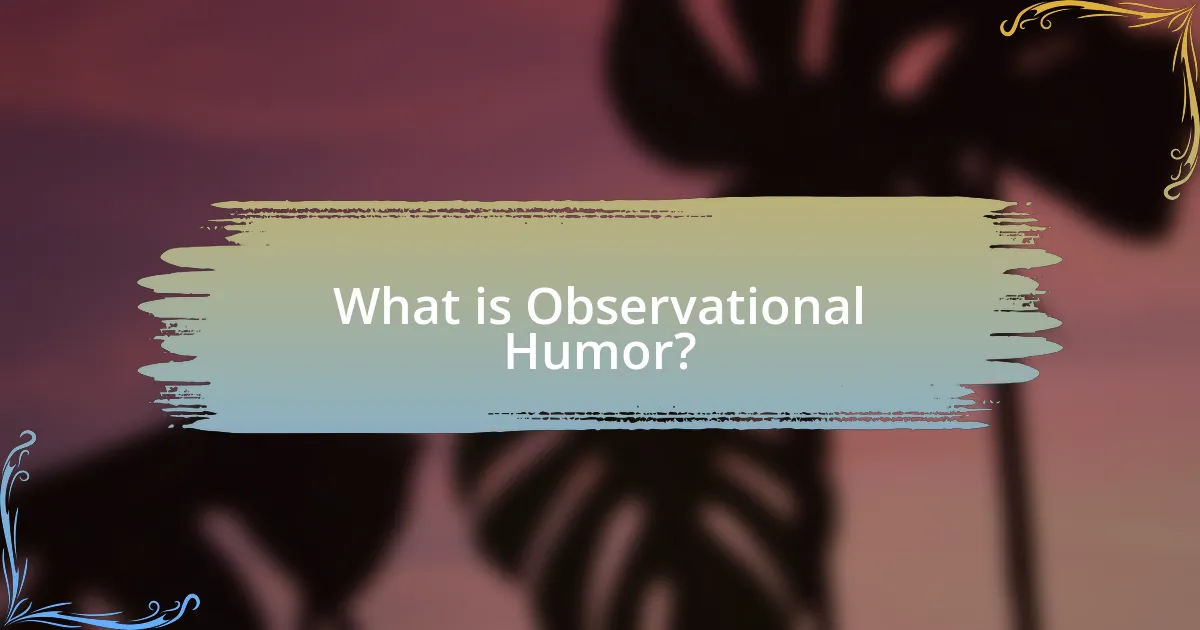Observational humor is a comedic style that draws its humor from everyday life experiences and common situations, making it relatable to a broad audience. This article explores the characteristics of observational humor, its effectiveness in connecting with audiences, and how it differs from other comedic styles. Key themes include the role of everyday life in humor, techniques for developing observational humor skills, and the psychological effects of humor on mood and social bonding. Notable comedians like Jerry Seinfeld and Ellen DeGeneres exemplify this style, showcasing how mundane moments can be transformed into comedic insights that resonate with listeners.

What is Observational Humor?
Observational humor is a comedic style that derives its humor from everyday life experiences and common situations. This type of humor often highlights the absurdities and quirks of daily routines, social interactions, and human behavior, making it relatable to a wide audience. Comedians like Jerry Seinfeld and Ellen DeGeneres exemplify this style by drawing on their personal observations and experiences, which resonate with listeners due to their familiarity. The effectiveness of observational humor lies in its ability to connect with audiences through shared experiences, making the mundane entertaining and insightful.
How does Observational Humor differ from other types of comedy?
Observational humor differs from other types of comedy by focusing on the mundane aspects of everyday life, highlighting relatable experiences and social norms. Unlike slapstick or situational comedy, which often rely on exaggerated scenarios or physical humor, observational humor draws its comedic value from the subtle absurdities and quirks of daily interactions. This style resonates with audiences because it reflects shared experiences, making it easier for people to connect with the material. Comedians like Jerry Seinfeld exemplify this approach, as they often base their routines on common occurrences, such as waiting in line or dealing with technology, which enhances relatability and engagement.
What are the key characteristics of Observational Humor?
Observational humor is characterized by its focus on everyday situations and relatable experiences. This type of humor often highlights the absurdities and quirks of daily life, making it accessible to a wide audience. It relies on keen observation and the ability to articulate common human behaviors, often using irony and exaggeration to emphasize the humor in mundane activities. For instance, comedians like Jerry Seinfeld have built their careers on observational humor by discussing topics such as waiting in line or the intricacies of social interactions, showcasing how these familiar scenarios can be both funny and insightful.
Why is Observational Humor effective in connecting with audiences?
Observational humor is effective in connecting with audiences because it highlights relatable experiences and shared human conditions. This type of humor resonates with individuals as it reflects their everyday lives, making them feel understood and validated. Research indicates that humor based on common experiences fosters social bonding and enhances group cohesion, as seen in studies by Robert Provine, which demonstrate that laughter often occurs in social contexts where people share similar backgrounds or situations. By tapping into the mundane aspects of life, observational humor creates a sense of familiarity, allowing audiences to engage more deeply with the content.
What role does everyday life play in Observational Humor?
Everyday life serves as the primary source of material for observational humor, as comedians draw upon relatable experiences and common situations to create humor. This connection to daily life allows audiences to recognize and resonate with the comedic content, enhancing its impact. For instance, comedians like Jerry Seinfeld have built their careers on highlighting mundane aspects of life, such as waiting in line or dealing with traffic, which reflects shared human experiences. The effectiveness of observational humor is supported by psychological studies indicating that humor derived from relatable scenarios fosters social bonding and enhances enjoyment, making everyday life an essential element in its creation and appreciation.
How do comedians find humor in mundane situations?
Comedians find humor in mundane situations by observing everyday life and highlighting the absurdities within it. They often focus on relatable experiences, such as waiting in line or dealing with technology, and exaggerate these scenarios to reveal the inherent humor. This technique is supported by the concept of observational humor, which emphasizes the comedic potential in common experiences that audiences can easily identify with. For instance, Jerry Seinfeld, a prominent observational comedian, often draws material from his daily interactions, showcasing how ordinary moments can be transformed into comedic gold through keen observation and clever wordplay.
What are some common themes in Observational Humor related to daily life?
Common themes in observational humor related to daily life include the absurdity of mundane routines, the quirks of social interactions, and the challenges of modern technology. These themes resonate because they reflect shared experiences, making them relatable to a wide audience. For instance, comedians often highlight the humor in everyday situations like grocery shopping, commuting, or family dynamics, showcasing how ordinary moments can reveal deeper truths about human behavior. This relatability is supported by studies indicating that humor derived from shared experiences fosters social bonding and enhances communication.

Why is Observational Humor important in comedy?
Observational humor is important in comedy because it connects with audiences through relatable experiences and shared realities. This type of humor draws on everyday situations, making it accessible and engaging for a wide range of people. For instance, comedians like Jerry Seinfeld have built successful careers by highlighting the absurdities of daily life, which resonates with audiences and fosters a sense of community. Research indicates that humor based on common experiences can enhance social bonding and improve mood, reinforcing its significance in comedic performance.
How does Observational Humor enhance relatability in performances?
Observational humor enhances relatability in performances by drawing on shared experiences and common situations that resonate with audiences. This type of humor connects performers to their audience through familiar scenarios, such as everyday frustrations or social interactions, making the content more accessible and engaging. Research indicates that when comedians use observational humor, they often reflect the audience’s own lives, which fosters a sense of camaraderie and understanding. For example, studies show that audiences are more likely to laugh at jokes that mirror their own experiences, as highlighted in the work of psychologist Peter McGraw, who emphasizes the importance of shared context in humor appreciation.
What impact does relatability have on audience engagement?
Relatability significantly enhances audience engagement by fostering a connection between the content and the viewers. When audiences perceive characters, situations, or themes as relatable, they are more likely to invest emotionally and cognitively in the material. Research indicates that relatable content can increase viewer retention and satisfaction, as evidenced by a study published in the Journal of Communication, which found that audiences are more likely to share and discuss content that resonates with their personal experiences. This connection not only boosts engagement but also encourages a sense of community among viewers, further amplifying their interaction with the content.
How can Observational Humor foster a sense of community among audiences?
Observational humor fosters a sense of community among audiences by highlighting shared experiences and relatable situations. This type of humor resonates with individuals because it reflects common daily life scenarios, creating a bond among those who recognize their own experiences in the jokes. For instance, comedians like Jerry Seinfeld have built careers on observational humor by discussing mundane topics that many people encounter, such as waiting in line or dealing with technology, which encourages laughter and connection among diverse audience members. This shared laughter reinforces social ties and fosters a collective identity, as individuals feel understood and validated in their experiences.
What are the psychological effects of Observational Humor?
Observational humor positively impacts psychological well-being by enhancing social connections and reducing stress. This type of humor allows individuals to relate to shared experiences, fostering a sense of belonging and community. Research indicates that laughter, often triggered by observational humor, releases endorphins, which can improve mood and alleviate anxiety. A study published in the journal “Psychological Science” by Robert Provine found that laughter strengthens social bonds and promotes feelings of happiness. Additionally, observational humor can serve as a coping mechanism, helping individuals navigate everyday challenges by providing a lighter perspective on life’s difficulties.
How does humor influence mood and mental health?
Humor positively influences mood and mental health by promoting feelings of joy and reducing stress. Engaging in humor can trigger the release of endorphins, the body’s natural feel-good chemicals, which enhance overall well-being. Research published in the journal “Psychological Science” by Martin et al. (2003) indicates that laughter can significantly lower levels of stress hormones, thereby improving mood and fostering resilience against mental health issues. Additionally, humor facilitates social connections, which are crucial for emotional support and mental health, as highlighted in studies showing that social laughter strengthens relationships and enhances feelings of belonging.
Why do people gravitate towards humor that reflects their experiences?
People gravitate towards humor that reflects their experiences because it fosters a sense of connection and relatability. When individuals encounter humor that mirrors their own life situations, it validates their feelings and experiences, creating a shared understanding. Research indicates that humor can enhance social bonds; for instance, a study published in the journal “Personality and Social Psychology Bulletin” found that shared laughter strengthens interpersonal relationships. This connection is rooted in the psychological principle of social identity, where individuals feel more aligned with those who share similar experiences, making the humor more impactful and enjoyable.

How can one effectively use Observational Humor?
To effectively use observational humor, one should focus on relatable everyday experiences and highlight the absurdities within them. This approach allows the audience to connect with the humor on a personal level, as they recognize similar situations in their own lives. For instance, comedians like Jerry Seinfeld have mastered this technique by drawing attention to mundane activities, such as waiting in line or the quirks of social interactions, making them universally funny. Research indicates that humor derived from shared experiences fosters social bonding and enhances audience engagement, as seen in studies on laughter’s role in group dynamics.
What techniques can be employed to develop Observational Humor skills?
To develop observational humor skills, individuals can employ techniques such as active observation, journaling, and practice through performance. Active observation involves paying close attention to everyday interactions and situations, identifying the nuances and absurdities that often go unnoticed. Journaling these observations helps in organizing thoughts and refining comedic material, as noted in studies on humor writing that emphasize the importance of capturing spontaneous ideas. Additionally, practicing through performance, such as stand-up comedy or improvisation, allows individuals to test their observational humor in real-time, receiving immediate feedback that can enhance their skills.
How can writers and comedians practice finding humor in everyday situations?
Writers and comedians can practice finding humor in everyday situations by engaging in regular observational exercises. These exercises involve actively noticing and reflecting on the mundane aspects of daily life, such as interactions, routines, and common frustrations. For instance, keeping a humor journal where they jot down amusing observations or thoughts can help sharpen their comedic instincts. Research indicates that comedians often draw from personal experiences and relatable scenarios, which enhances their ability to connect with audiences. By analyzing these moments and experimenting with different comedic styles, writers and comedians can refine their craft and develop a unique voice in observational humor.
What are some tips for refining Observational Humor in performances?
To refine observational humor in performances, comedians should focus on honing their observational skills, practicing delivery, and engaging with their audience. Observational humor relies on keen awareness of everyday situations, so regularly noting amusing details in daily life can enhance material. Additionally, practicing timing and pacing is crucial, as the effectiveness of a punchline often hinges on its delivery. Engaging with the audience through relatable anecdotes fosters connection, making the humor more impactful. Research indicates that comedians who adapt their material based on audience reactions tend to achieve higher engagement and laughter rates, reinforcing the importance of audience interaction in refining observational humor.
What are common pitfalls to avoid in Observational Humor?
Common pitfalls to avoid in observational humor include relying on clichés, being overly negative, and failing to connect with the audience. Clichés can make humor feel stale and unoriginal, diminishing its impact. Overly negative humor can alienate audiences, as it may come off as bitter rather than relatable. Additionally, failing to connect with the audience’s experiences can lead to misunderstandings, as humor often relies on shared context. These pitfalls can hinder the effectiveness of observational humor, making it less engaging and relatable.
How can comedians ensure their humor remains inclusive and respectful?
Comedians can ensure their humor remains inclusive and respectful by actively considering the diverse backgrounds and experiences of their audience. This involves avoiding stereotypes, being mindful of sensitive topics, and focusing on shared human experiences rather than divisive themes. Research indicates that humor that promotes inclusivity can enhance audience engagement and foster a positive atmosphere, as seen in studies highlighting the effectiveness of humor in bridging cultural gaps. By prioritizing empathy and understanding, comedians can create a comedic environment that resonates with a broader audience while minimizing the risk of alienation or offense.
What mistakes should be avoided when crafting observational jokes?
When crafting observational jokes, avoid relying on clichés, as they diminish originality and impact. Clichés often fail to resonate with audiences because they lack freshness and can make the joke predictable. Additionally, steer clear of overly complex setups that confuse the audience; clarity is essential for humor to land effectively. Research indicates that jokes with clear and relatable setups are more likely to elicit laughter, as seen in studies on humor perception. Lastly, avoid making jokes that alienate or offend specific groups, as this can lead to backlash and disengagement from the audience. Observational humor thrives on shared experiences, so inclusivity enhances relatability and enjoyment.
What are some examples of successful Observational Humor?
Successful observational humor includes the comedic styles of Jerry Seinfeld, Ellen DeGeneres, and Louis C.K. Jerry Seinfeld often highlights the absurdities of everyday situations, such as the quirks of social interactions and mundane activities, exemplified in his show “Seinfeld,” which became a cultural phenomenon. Ellen DeGeneres uses observational humor to discuss relatable topics like the challenges of modern life and social norms, effectively engaging her audience through her stand-up routines and daytime talk show. Louis C.K. frequently draws on personal experiences and societal observations, such as parenting and technology, to create humor that resonates with many, as seen in his acclaimed series “Louie.” These comedians successfully connect with audiences by reflecting shared experiences and highlighting the humor in daily life.
Who are some notable comedians known for their Observational Humor?
Notable comedians known for their observational humor include Jerry Seinfeld, George Carlin, and Ellen DeGeneres. Jerry Seinfeld is renowned for his ability to find humor in mundane aspects of daily life, as showcased in his iconic television series “Seinfeld.” George Carlin’s sharp observations on societal norms and language have made him a pivotal figure in stand-up comedy. Ellen DeGeneres often draws on her personal experiences and everyday situations to connect with audiences, exemplified in her stand-up specials and television appearances. These comedians effectively highlight the humor inherent in everyday life, making their work relatable and impactful.
What are some iconic routines that exemplify Observational Humor?
Iconic routines that exemplify observational humor include George Carlin’s “Seven Words You Can Never Say on Television,” Jerry Seinfeld’s “What’s the Deal with Airplane Food?” and Ellen DeGeneres’s “Phone Call.” These routines highlight everyday experiences and societal norms, making them relatable to audiences. For instance, Carlin’s routine critiques language and censorship, while Seinfeld’s observations on mundane topics like food during flights resonate with common frustrations. DeGeneres’s take on the absurdity of phone conversations showcases the humor found in daily interactions. Each of these routines effectively captures the essence of observational humor by turning ordinary situations into comedic commentary.
How can one incorporate Observational Humor into daily life?
To incorporate observational humor into daily life, one should actively notice and comment on the mundane aspects of everyday experiences. This involves paying attention to common situations, behaviors, and interactions that often go unnoticed, such as the quirks of public transport or the peculiarities of social gatherings. By highlighting these relatable moments with a humorous twist, individuals can create laughter and connection with others. Research indicates that humor can enhance social bonds and improve mental well-being, as seen in studies published in the Journal of Humor Research, which demonstrate that shared laughter fosters stronger relationships.





